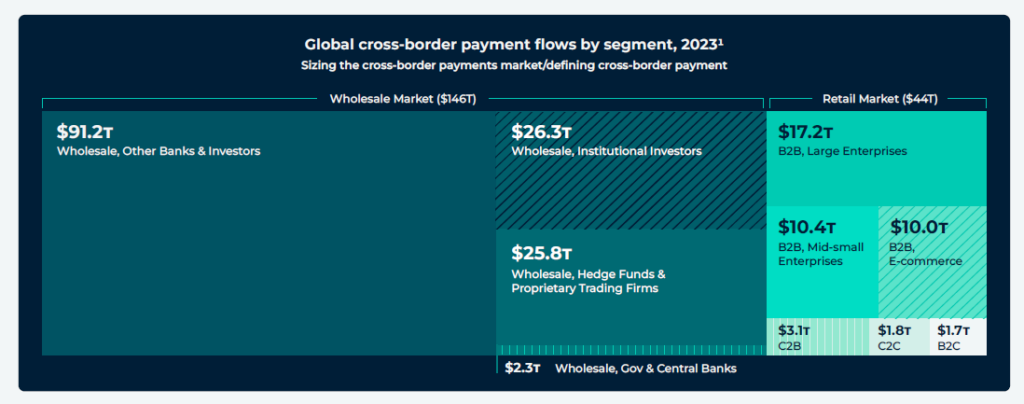Convera is excited to announce the official release of Fintech 2025+, a deep dive into the trends, technology and transformation driving global commerce today. Developed in partnership with Oxford Economics and The Paypers, this insightful report analyzes the current and future state of the fintech sector, highlighting the crucial role of cross-border payments in international trade and finance.
As the digital age reshapes global commerce, demand for innovative, efficient and secure payment methods is skyrocketing. The fintech landscape is evolving rapidly, with trends such as automation and transparency playing an important role. Established financial institutions are also adapting to these changes by integrating new technologies to stay competitive. Whether you’re a small business owner, CFO or treasurer, Fintech 2025+ is designed to make more effective decisions and drive your success in the digital age.
Rapid growth of cross-border payments
Fintech 2025+ highlights a vast cross-border payments landscape, with the wholesale market (high-value transactions between commercial banks) reaching 146 trillion dollars in 2023. The associated revenue pool reached approximately $193 billion, split between transaction fees and foreign exchange revenue.
North America leads the market with 28% of total revenue, benefiting from a robust technological infrastructure and a favorable legal framework. However, Asia Pacific follows closely with 26% of global revenues, driven by rapid infrastructure development and digital adoption. By 2030, the wholesale cross-border payments market is expected to grow by 54% to a whopping $225 trillion.

Fintech services play a crucial role in improving cross-border payments by providing innovative solutions and improving efficiency. Cross-border payments market leaders, including major financial institutions, are leveraging these advances to improve their services.
Real-time payments set to boom
Real-time payments (RTP) are growing rapidly globally. Transactions are expected to reach 511.7 billion by 2027marking an annual growth rate of 21.3%. The rise of RTP is fueled by consumer demand for instant transactions, facilitated by mobile wallets and digital apps.
The fintech space is evolving with the adoption of real-time payments, shaping B2B and B2C transactions, improving security and facilitating cross-border payments. Banks are presented with significant opportunities by adopting RTP to meet customer demands and market developments. The RTP boom offers great potential to transform the efficiency of international transactions, with the G20 prioritizing an initiative to see 75% of cross-border payments will reach recipients within an hour by 2027.
Digital assets are a game changer
To address the limitations of traditional cross-border payment systems, such as slow delivery times and lack of transparency, the report reveals that fintech companies and financial technology companies are leveraging innovative technologies such as blockchain. This private sector innovation has attracted the interest of governments and institutions around the world, leading to the development of stable coins and central bank digital currencies (CBDCs) aimed at improving cross-border transactions.
The concept of “Finternet”, imagined by the Bank for International Settlements, represents an interconnected financial ecosystem using technologies such as tokenization and unified ledgers to improve financial services, particularly in emerging markets. Despite market volatility, stablecoins grew by 5.6%, driven by greater regulatory understanding and clarity. Forward-thinking banks are exploring and integrating digital assets into their offerings, with notable examples including JPMorgan Chase’s JPM Coin and Santander’s One Pay FX.
Open banking positioned to transform payments
The financial sector is undergoing a significant transformation with the advent of open banking systemwhich promotes transparency and innovation by making various datasets publicly available and encourages the development of innovative applications and research in various fields. This development points to a future in which data sharing influences multiple sectors, driven by regulatory frameworks, technology and societal attitudes, and is further enhanced by the integration of digital banking services.
Fintech 2025+ highlights that while Europe remains ahead in APIs, open banking has gained momentum in the United States, where institutions such as Citi Bank, US Bank and Wells Fargo are now making substantial progress. However, regulatory developments in the United States and Canada, such as data privacy laws and the Digital Charter Implementation Act, emphasize growing privacy concerns and a unified data market.
Fintech startups are driving innovation in open banking, challenging traditional financial service providers and offering faster, more efficient solutions.
Furthermore, integrated finance reshapes customer interactions by integrating financial services into non-financial platforms, to improve convenience and accessibility. This approach, supported by Banking as a Service (BaaS), is expected to generate significant growth, with the potential of embedded finance reaching $7.2 trillion over the next decade.
Fraud continues to become more sophisticated
Fraudulent activity continues to evolve, with the report revealing that a significant number of businesses have suffered losses. up to 1 million EUR/USD in 2023. The immediacy of RTPs poses additional challenges for accounts payable because transactions on networks like Zelle and FedNow are processed instantly, leaving little time for fraud checks. With mobile wallets and deepfake technology presenting additional risks, combating all of this requires a multi-layered approach, which includes in-system security measures, customer education and industry collaboration for online fraud detection. real time.
Credit unions are combatting these fraud risks by implementing advanced fintech solutions to improve their security measures.
Welcome to the world of fintech and regtech
Emerging regulatory trends in 2024 suggest significant changes for fintechs and companies engaged in cross-border payments within the financial sector. Open banking and data sharing are transforming financial interactions, but these advances have increased the risks of fraud. To counter this, banks are investing in strict onboarding controls and in-depth monitoring of customer interactions.
Venture capitalists play a crucial role in driving innovation in regtech, particularly in AI-enabled financial activities.
Regtech, or regulation technologyis advancing rapidly to address the risks of rapidly changing technology. The global regtech market is expected to reach over $85 billion by 2032driven by innovations in KYC, AML and AI-based solutions for sanctions screening and transaction monitoring. These technologies improve fraud detection and compliance, but also pose challenges, such as the need to make explainable decisions via AI.
An essential resource for navigating global trade and commerce
Download Fintech 2025+ now and don’t miss this essential guide to navigating the complexities of global trade.
As we embark on this journey of technological evolution, it is crucial to find the right partner to guide your business into this new era of opportunity. Convera provides technology-enabled payment solutions to help more than 26,000 customers worldwide grow with confidence, from small businesses to CFOs and treasurers. As a global commerce fintech, Convera powers international commerce by easily moving money across a financial network of more than 140 currencies, 200 countries and territories, and 70 regulatory licenses worldwide.
Want more information on the topics shaping the future of cross-border payments? Log in to Convergewith new episodes every Wednesday.
More, sign up for daily market update to get the latest currency news and exchange analysis from our experts.

